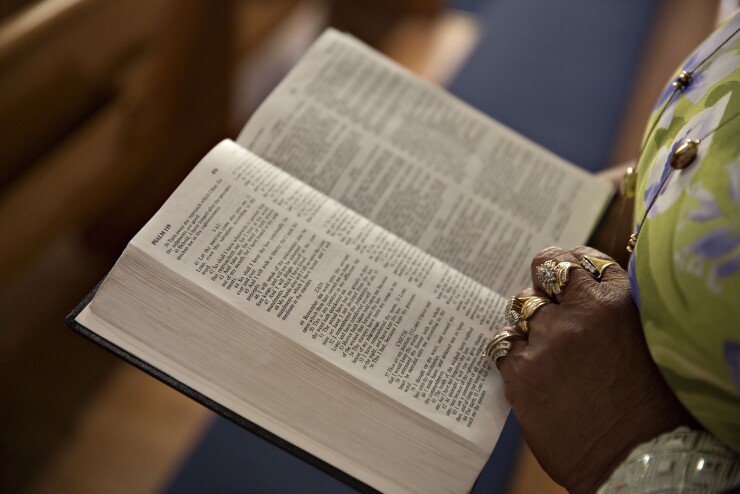What used to be known as socially responsible investing (SRI)
But, what this means to devout investors can vary widely based on various factors.
Robert Duncan, owner of
Duncan said he hopes more people will think about living out their beliefs more than just the one day a week they spend at their places of worship.
READ MORE:
"We compartmentalize everything," he said. "Our faith is something we do on Sundays or one night a week, or when we go on a mission trip. … How do we view the world? How can we overlap that with what we do financially? I don't think people think deeply about those goals and callings and how they intersect with their finances. Sometimes they feel their beliefs are something they'll do later in life. 'Right now, I'm working.' I'm trying to bring those back into alignment with folks saying, 'No, you can do some of those things right now.'"
What to screen out? It all depends.
Guli Fager, a financial advisor at
Because Quakers don't usually have clergy in their churches, members are free to make their own financial decisions, said Fager.
READ MORE:
"There isn't anybody who's telling us, 'Thou shalt not invest in the following things,'" she said.
Traditionally, though, the endowments of Quaker nonprofits exclude investments in casino gambling, alcohol, tobacco, firearms and military contractors, said Fager. In recent years, that list has expanded to also exclude investments in fossil fuel companies, private prisons and businesses that use child labor.
Benjamin Bailey is vice president of investments and a senior fixed-income investment manager for Praxis Mutual Funds and Everence Financial, "a leading provider of faith-based financial products." They provide a variety of specific strategies, including values-based screens. Though, Bailey said, what that can mean can run the gamut.
"In a social climate fraught with division, Praxis is grateful to attract investors with a wide range of convictions," he said. "They may be motivated by traditional values that emphasize personal morality expressed through specific screening or engagement that addresses systemic social and environmental challenges, but these investors want to be productive stewards of their God-given resources."
Duncan said excluding parts of the portfolio through custom indexing and portfolios that may run afoul of a client's beliefs is challenging in public markets. These beliefs can fall on a broad spectrum based on any number of factors, including location.
"In typical Baptist screens … it's typically been alcohol, tobacco, pornography and gambling," he said. "Not everyone lands on the same spot on alcohol. Frankly, if you're a Christian in Kentucky, even tobacco starts to get a little bit questionable."
And depending on how large the companies in question are, one part of the business might be acceptable, while another might not be.
READ MORE:
"We might screen out Anheuser-Busch, for example, but we also invest in Costco, which is one of the largest distributors of alcohol," he said. "Where do we draw that line? I've always taken the approach that for some people, if that's something that they want to lean into, we try to just weed out the real big 'offenders' for them. I mean, there aren't that many publicly traded porn companies out there."
Jonathan M. Owens, vice president and partner of
"I don't feel that there is anything morally wrong with investing in a publicly traded company that you may have disagreements with," he said. "Owning their company stock does not benefit them in any way and therefore you're not promoting their misbehavior. There is a moral case to be made from you personally benefiting from their profits. On the other side of that, if you participated in the IPO of the stock or in their bonds when they're raising money, then you would be benefiting them and their cause or beliefs. In the end, I'd pick managers with a good track record that stay as neutral as possible while avoiding ESG factors that you do not agree with."
Faith-based alternative investments
For high net worth investors, there are also faith-driven alternative investments and private venture capital that can be included, Duncan said.
"There are farmland portfolios that are dealing with what we would call 'creation care' in the industry," he said. "How do we use ecologically sustainable harvesting practices that are good for the land, but also are great because they enhance crop yields? How can we win both financially … while also doing good in the world?"
Dillon Kenniston is the founder and lead planner at
"We either choose another fund or recreate a proxy for the fund by building a sleeve of stocks that the client is willing to hold," he said. "But that's the exception for our clients, not the norm."
More typically, Kenniston said his clients invest in and hold rental real estate directly. His firm is located in Berks County, Pennsylvania, which is next door to Lancaster County, which has the largest Amish population in the world.
"These are men and women who don't mind the messiness that comes with doing life together," he said. "They're not commonly involved in big syndications. Their tenants are their neighbors. They invite them to church and over for meals. I'm excited about what the future holds for investment management. ESG has opened the door to values-based investing. And clients' values are unique; their portfolios should reflect the same. We do all that we can to support our faith-based clients as they seek to align their money with their values."






